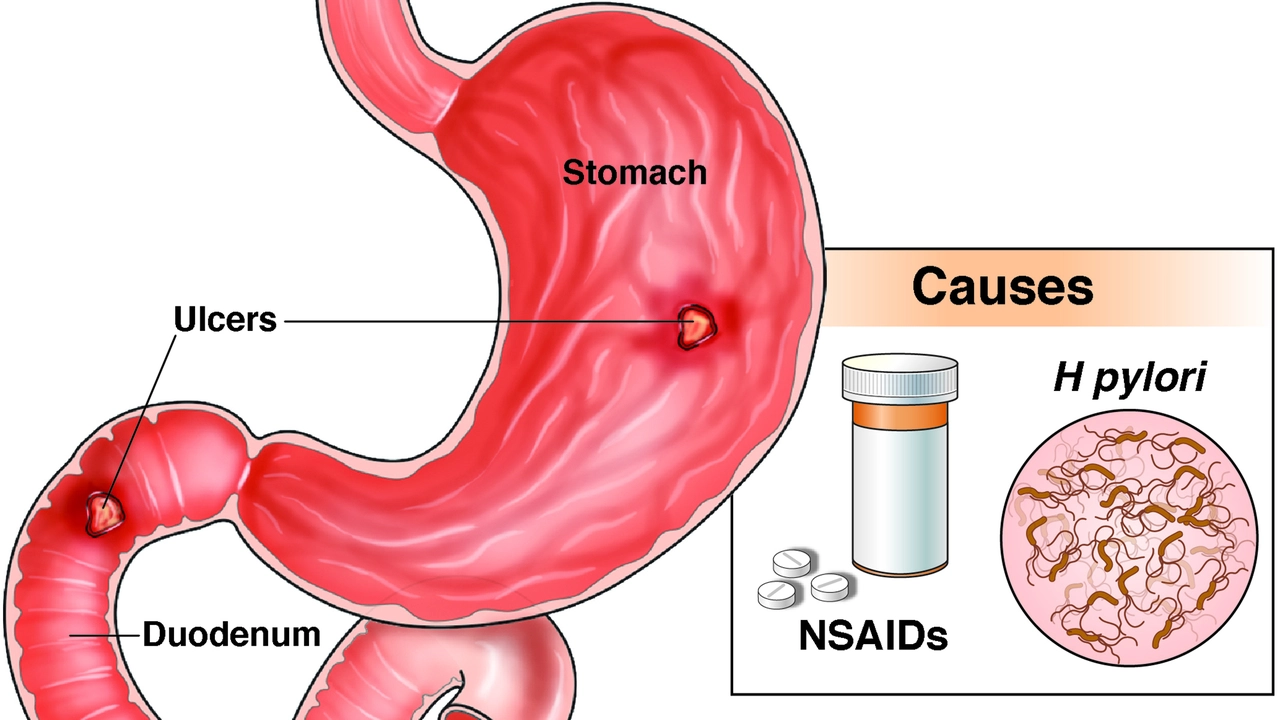Ulcer management: practical steps to heal and prevent stomach ulcers
A peptic ulcer can feel like a burning, constant problem — but most stop hurting and heal when you use the right treatment. This short guide gives clear, useful steps you can use now: how doctors treat ulcers, what to change at home, and the warning signs that mean you need urgent care.
Medical treatments that work
Most ulcers are caused by Helicobacter pylori bacteria or by regular use of NSAIDs (ibuprofen, naproxen). If H. pylori is found, the standard approach is a short course of antibiotics plus a proton pump inhibitor (PPI). You may hear names like clarithromycin, amoxicillin, metronidazole and medications such as omeprazole or pantoprazole. Doctors choose combinations based on local resistance patterns and your allergies.
If H. pylori isn’t the cause, stopping NSAIDs and treating with a PPI or an H2 blocker such as famotidine usually helps. Antacids can ease pain short-term; sucralfate can coat the ulcer and protect it while it heals. Follow the full course your provider prescribes — stopping antibiotics or acid medicine early raises the chance the ulcer comes back.
Everyday changes that speed healing
Small habits make a big difference. Stop NSAIDs if you can; talk to your doctor about switching to acetaminophen for pain. Quit smoking — it delays ulcer healing and raises the risk of recurrence. Cut back on alcohol and avoid heavy drinking while you’re being treated. Spicy food doesn’t cause ulcers, but it can irritate a sore stomach, so eat what feels comfortable.
Eat regular, balanced meals. Very large meals or long fasting can worsen symptoms for some people, so try smaller portions more often. Caffeine and carbonated drinks can bother sensitive stomachs; experiment to see if they affect you. Some studies show probiotics may help when added to antibiotic treatment for H. pylori — ask your doctor if that’s appropriate.
Follow-up matters. Your doctor may want a breath, stool, or blood test to confirm H. pylori is gone, or an endoscopy if symptoms are severe or return despite treatment. Don’t skip follow-up testing: persistent infection or ongoing damage needs a different plan.
Know the red flags. Go to the emergency room if you have sudden severe belly pain, black or tarry stools, bloody vomit, fainting, or signs of shock. Those symptoms can mean bleeding or a hole in the stomach lining — conditions that need immediate care.
Ulcers are common but treatable. With the right medicines, some simple lifestyle changes, and prompt follow-up, most people recover fully and get back to normal life. If you’re unsure about symptoms or treatment, call your healthcare provider — it’s better to check than to wait.
The Importance of Early Diagnosis and Treatment for Stomach Ulcers
Hey, folks! So, I've been reading up on stomach ulcers and boy, it's a whole new world in there! Early diagnosis and treatment of these pesky ulcers are like the superheroes of the gut world, swooping in just in time to save the day. With a quick diagnosis, we can jump right into treatment and wave goodbye to those bellyaches, nausea, and heartburn. Plus, we can avoid complications that sound like plot twists in a horror movie - think bleeding ulcers and perforations. So, let's not be shy, folks, let's get those tummies checked and keep the ulcer monsters at bay!
View More
